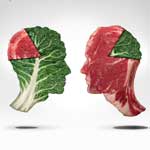For both environmental and ethical reasons, it seems that an increasing number of people are deciding to follow a meat free diet. The reasons behind these changes are real concerns backed by scientific facts and global eco-friendly alarms.
Meat production exhausts too many natural resources, such as water.
Furthermore, some concerned activist declare that it does not seem fair that animals should suffer horrible deaths just because of our desires to eat meat daily.
Additionally, if we take a closer look at other important factors, and we start asking simple questions like why people eat meat in the first place? What is the role of meat in our evolutionary development? Most importantly, do we need meat to stay healthy? Maybe we can arrive at different conclusions.
Humans as species are omnivores.
Like bears or pigs, we eat everything edible, and while we do not need to eat meat every day to survive, its role in our diet and its potential health benefits should not be easily overlooked.
Regardless of any popular dietary trends, we want to examine the true role of meat in the human diet. If this is something that interests you, you will find this article very helpful.
The other side of a Meat Free Diet
More and more people worldwide are turning to a vegetarian or vegan lifestyle. Thinking in general terms and about the repercussions of a meat free diet might seem like good news, but researchers are not sure that such a shift is completely healthy.
Red meat is associated with an increased risk of cancer and chronic diseases such as diabetes and hypertension.
However, these are the effects of frequent and long-term consumption. We do not need to hunt for meat anymore. It is easily available, and we eat it way too often. These are the facts.
For most of our existence on Earth, meat was a long-lusted treat.

The question is, why did we do this? Plant-based food was always more accessible.
Serious experts do not challenge the important role of meat in our evolutionary development. Some of them just argue that today we can replace meat successfully and we do not need it as much, or at all. This might be true.
Our current knowledge about nutrition suggests that it is. Still, it would not be the first time in human history that we think we know something for sure and then it turns out we didn’t. With this in mind, let’s look at some positive health effects of meat.
Balance – The Most Important Principle of Nature

Vitamin D, also known as the sunshine vitamin, can be found in very few foods. Most of them are of animal origins, such as oily fish, animal liver, eggs, and cheese. This vitamin has a very important role in bone and teeth development as well as in our immune system functioning.
Vitamin B12 is also abundant in meat, eggs, and dairy products. Vitamin B12 deficiency can weaken the immune system and cause symptoms such as fatigue, memory loss, impaired vision.
Finally, meat is carb-free.
This is important if we know that carb-rich diet is the main reason for obesity and various chronic health problems associated with it. Because of this, recent studies show that vegans and vegetarians have a 20% higher risk of experiencing a stroke or a heart attack. However, this risk can be lowered with careful meal planning.
The Bottom Line
Things need to change. Meat production as we know it is unsustainable and brutal to animals and the environment. However, this does not mean that a 100 % Meat Free Diet should be the way to go. The health benefits of moderate meat consumption are real. Lean meats and fish are especially important.
While we must make a huge shift towards a plant-based diet, we also need to maintain the evolutionary nutritional balance that made us into the most successful species on this planet.






